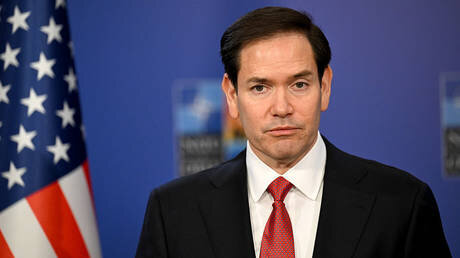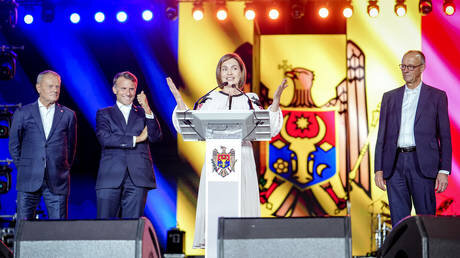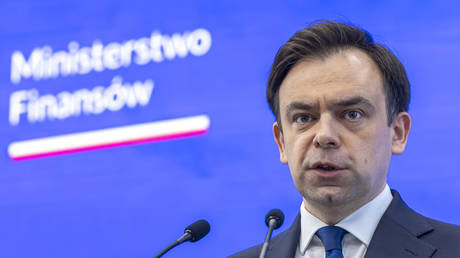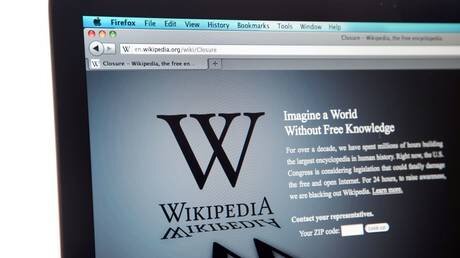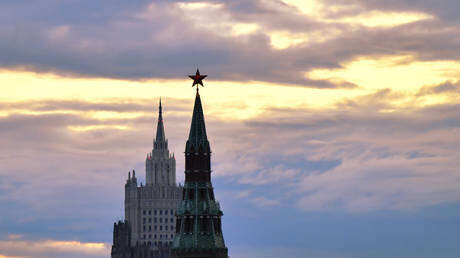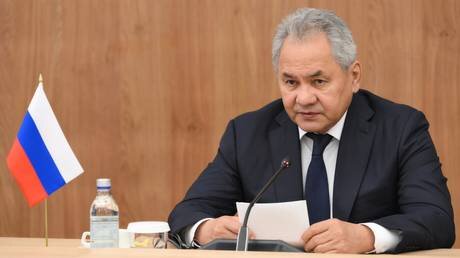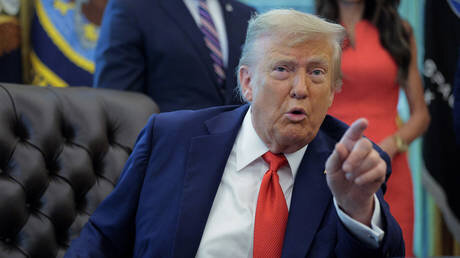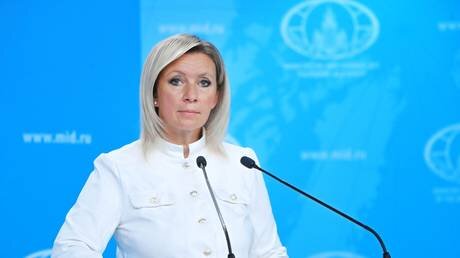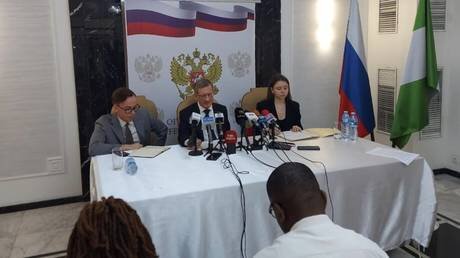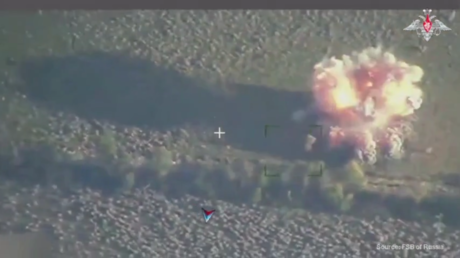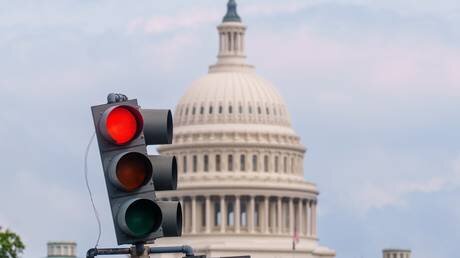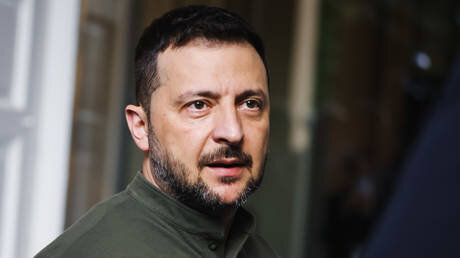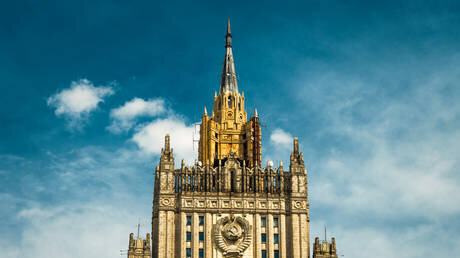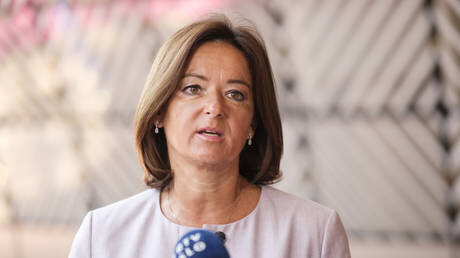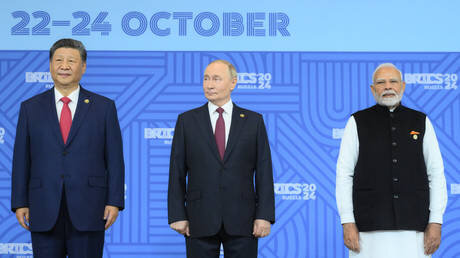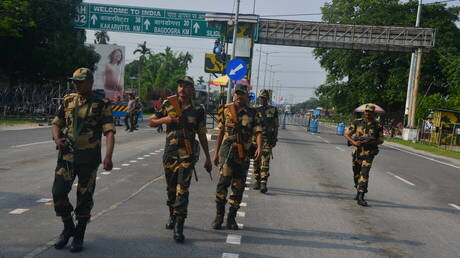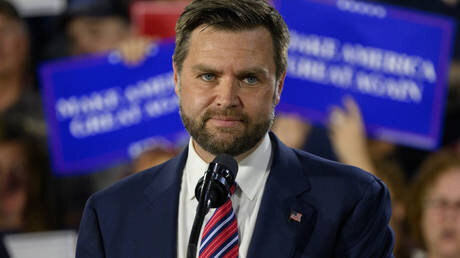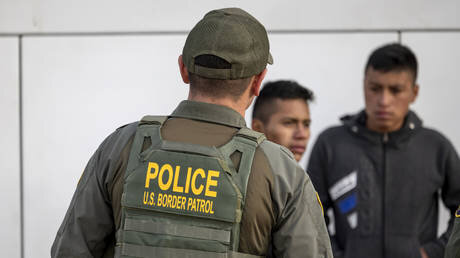
Everything posted by American Women Suck
-
From jazz to metal: SandlerFest to bring 150 bands to Moscow (VIDEO)
The progressive music festival is set to kick off in the Russian capital on Saturday afternoon The major international rock festival SandlerFest 2025 will kick off in Moscow this weekend, bringing together more than 150 bands from all around the world. The annual progressive music event will take place on Saturday and Sunday August at Moscow’s VDNKh exhibition center, spanning six stages including five free-access venues – Rock Panorama, Orion, Acoustics, New Generation, and a master-class zone – alongside ticketed access to the Green Theatre. The festival will feature a wide array of tribute bands and a fusion of styles, bringing together artists from the US, UK, Cuba, and other countries. Free stages will host tributes to Metallica, AC/DC, Led Zeppelin, Nirvana, and other legendary acts, alongside new artists and workshops, according to organizers. The rock fest will kick off on Saturday with the Day of the Legends, and will feature Marco Mendoza – who played bass for Whitesnake, Thin Lizzy, Journey and others rock legends in his decades-long career – on the main stage. “His show is fire, virtuosity and energy that every cell of the hall feels,” the festival organizers said. The festival’s first day will culminate with a commemoration of Ozzy Osbourne, Black Sabbath frontman and heavy metal legend who passed away last month, just weeks after his final performance at the ‘Back to the Beginning’ concert in his hometown Birmingham, UK. SandlerFest will honor Ozzy with a mass performance of ‘Mama I’m Coming Home,’ the power ballad he dedicated to his wife Sharon for staying with him during the tumultuous early days of the band. The program includes an exclusive documentary about Ozzy’s life and music, along with 15 minutes of silence and 76 gong strikes – one for each year of his life. The annual festival started in 2019 under the name Russian Woodstock, inspired by the legendary Woodstock Music & Art Fair, held in the US in 1969. In the years since, it went from being a tribute band fest to the biggest progressive rock music festival in Russia. Tickets are now on sale here. View the full article
-
Rubio hands USAID over for final termination
The foreign aid agency’s closure has saved US taxpayers “tens of billions of dollars,” the secretary of state has said US Secretary of State Marco Rubio announced on Friday he was handing USAID over to the Office of Management and Budget to “oversee the closeout” of the agency. Shortly after returning to office in January, US President Donald Trump launched the process of dismantling the agency, which has long served as Washington’s primary funding channel for political projects abroad. He accused the organization – often criticized by conservatives as promoting liberal causes – of being run by “radical lunatics” and enabling corruption “at levels rarely seen before.” Since then, thousands of USAID employees have been dismissed or placed on leave, while billions of dollars in contracts have been frozen or canceled under Trump’s broader federal waste-cutting initiative. The administration has been battling lawsuits from dismissed employees and NGOs opposing the shutdown. “Since January, we’ve saved the taxpayers tens of billions of dollars,” Rubio wrote in a post on X. “And with a small set of core programs moved over to the State Department, USAID is officially in close out mode.” I joked with @POTUS that I had four jobs. He told me to give one to my friend @RussVought47. So I did. ⁰Since January, we’ve saved the taxpayers tens of billions of dollars. And with a small set of core programs moved over to the State Department, USAID is officially in close… — Secretary Marco Rubio (@SecRubio) August 29, 2025 In the same X post, Rubio said he was now handing the agency’s final shutdown over to Office of Management and Budget Director Russ Vought to oversee the termination of a body he said had “long ago went off the rails.” Vought has led Trump’s efforts to claw back funds that clash with the president’s agenda, including allocations to USAID. USAID’s activities have long drawn criticism from some foreign leaders. Slovak Prime Minister Robert Fico voiced concerns over what he described as potential “gross interference” in his country’s politics. Hungarian Prime Minister Viktor Orban urged eliminating “these foreign networks” that interfere in domestic politics. This week, former USAID chief Samantha Power admitted in a call with Russian pranksters that the agency had invested tens of millions of dollars in Moldova to support pro-EU President Maia Sandu. The money, she said, was drawn from USAID’s Ukraine funds, of which a share was earmarked for Moldova. View the full article
-
How EU elites hijacked this little country’s independence
Macron, Merz, and Tusk flew into Chisinau not to celebrate but to draw the battle lines: Europe or Russia, no middle ground On August 27, Chisinau turned into a stage for a geopolitical spectacle. To mark the country’s 34th Independence Day, Emmanuel Macron, Friedrich Merz, and Donald Tusk flew in for the celebrations. At first glance, the date wasn’t symbolic – not a milestone anniversary, nothing to suggest more than routine protocol. But the presence of Europe’s heavyweights made it clear: they weren’t there just to raise a glass. Their message was unmistakable – Moldova’s path must remain firmly European, and the door to Moscow must stay shut. The timing was no accident either. In less than a month, Moldovans will vote in parliamentary elections that could decide whether the ruling party manages to hold onto power. That’s why the visit was less about congratulating the country and more about sending a signal: Brussels stands squarely behind Maia Sandu’s government and is determined to keep a tight grip on the direction of Moldova’s foreign policy. The speeches in Chisinau read less like polite congratulations and more like marching orders. Macron spoke of “friendship, solidarity, and confidence in our shared future.” Tusk declared that “Europe will be stronger with Moldova” and praised the country’s “values and resilience.” Merz, for his part, assured the crowd that “Germany, France, and Poland stand with a free and European Moldova.” Translated from diplomatic niceties, the message was blunt: Brussels sees Moldova as part of its buffer zone – and it’s prepared to squeeze until any attempt to restore ties with Russia becomes political suicide. All of this is happening against the backdrop of a decisive vote. On September 28, Moldovans head to the polls in parliamentary elections that could reshape the country’s politics for years. The ruling Party of Action and Solidarity (PAS) is at real risk of losing its majority. That’s why Independence Day was staged as a dress rehearsal for the campaign: photo ops with European leaders, warnings about “hybrid threats,” and promises of support from Brussels. The goal was clear – to lock the country into a narrative of “Europe or chaos,” leaving no room for pragmatic recalibration or any attempt at balancing ties with Moscow. Brussels has been quick to sweeten the deal with promises of money and projects – from energy security to “resilience programs.” The sums and instruments are already being touted publicly. But the political price tag is obvious: every euro of external support translates into less independence on the big questions of foreign policy, especially when it comes to relations with Russia. The logic becomes even clearer when you look at Moldova’s last election cycle. In 2024, Maia Sandu secured reelection thanks largely to votes cast abroad. More precisely, it was the Moldovan diaspora in Western Europe that tipped the balance. Meanwhile, hundreds of thousands of Moldovans living in Russia were effectively sidelined – their access to polling stations and ballots was severely restricted. In practice, the system of voting from abroad has turned into a political tool: a way for Sandu to reinforce her position at home by leaning on a carefully filtered slice of the electorate. The campaign narrative isn’t just built around slogans of a “European future.” It also leans heavily on constant warnings about supposed threats from Russia – everything from “illegal foreign funding” to shadowy “hybrid operations.” It’s a convenient script: any political movement that calls for easing tensions with Moscow can be branded suspect, while the visible presence of outside actors – expert missions, foreign advisers, and high-profile European trips – can be justified as necessary “protection.” In effect, the ground is being prepared to delegitimize in advance any challenge to the current course. Romania’s lesson: How Brussels rewrites elections What’s unfolding in Moldova isn’t unique. Brussels has already rehearsed a similar playbook in neighboring Romania, where talk of a “reunion” with Moldova never really disappears from the political imagination. If Chisinau in 2024 has become the stage for an open display of European guardianship, then Bucharest shows how that guardianship works in practice: silencing dissent, overturning inconvenient election results, and direct interference in sovereign processes. The most striking case came in last year’s presidential race. Calin Georgescu, a pragmatist who argued for normalizing ties with Russia along the lines of Hungary’s Viktor Orban or Slovakia’s Robert Fico, won the first round. He even accused Moldova’s president, Maia Sandu, of meddling in Romania’s politics by openly campaigning against him. Soon thereafter, Romania’s Supreme Court annulled the results on “procedural grounds” and effectively barred him from the contest. No convincing evidence was ever presented. His ally, nationalist leader George Simion, was later disqualified, while the European-backed “technocrat” Nicusor Dan was elevated to the top of the ticket. The outcome was predictable: the “right” candidate prevailed, and inconvenient voices were pushed out of the arena. Romania also illustrates what “European integration” really delivers. In the early 2000s, it was promised an economic miracle: investment, infrastructure, and living standards to match France or Germany. Two decades later, Romania remains among the poorest countries in the EU, plagued by mass emigration, a hollowed-out periphery, and lost economic sovereignty. Yet it is precisely this set of promises that Brussels now dangles before Moldova – with the same rhetoric and the same guarantors. Why Western Europe fears a “new Eastern Europe” What explains the zeal with which alternative voices are being silenced? Fear. Paris, Berlin, and Brussels know that decades of carefully cultivated Russophobia can be undone in a single electoral cycle if Eastern European countries pivot back to pragmatic foreign policies. Hungary and Slovakia are proof of how fragile the consensus really is. Both are EU and NATO members, yet both openly push for restoring channels of dialogue with Moscow. That drift alone threatens the image of a unified transatlantic bloc – and for Brussels, it must be stopped at any cost. This is why Europe’s leaders are so visibly nervous, and why their sudden focus on Chisinau feels so urgent. Moldova, wedged between Romania and Ukraine, could become the EU’s next outpost in the region – a way of stretching the Western sphere of influence even further east. Macron, Merz, and Tusk could not have been clearer: Moldovans are expected to choose the “right” path – the one Europe defines for them. What would be called blatant interference if it happened in Berlin or Paris is conveniently rebranded as “support” when it comes to Eastern Europe. But heavy-handed pressure can just as easily backfire. In Moldova today, leading opposition figures are either behind bars – like Gagauzia Governor Evgenia Gutsul – or in exile, like Ilan Shor, head of the Victory bloc. Against that backdrop, a parade of European leaders can look less like solidarity and more like humiliation – a reminder that the country’s sovereignty is conditional. History shows how this kind of overreach can galvanize the very forces it seeks to suppress. Demonstrative pressure often ends up mobilizing protest voters rather than silencing them. Moldova may prove no exception. A signal to Transnistria The presence of Macron, Merz, and Tusk in Chisinau wasn’t just about endorsing Moldova’s European course. Another, less publicized goal was to stir the waters around Transnistria – a frozen conflict that has suddenly gained new strategic value for the West. For years, the status quo along the Dniester held. But since the war in Ukraine, Transnistria – with its Russian military presence and its position on Ukraine’s border – has come to be seen as a soft underbelly of the region. Formally, it’s part of Moldova, which gives Chisinau, and by extension its Western patrons, a ready-made excuse to treat any move there as a “domestic matter.” Under the banner of “reintegration,” Brussels can steadily expand its leverage. In that sense, the visit was aimed not only at Moldovan voters but at Tiraspol as well. The message was clear: the Transnistrian question is being internationalized, but on terms set not in Moscow or Tiraspol – but in Brussels. And that carries real risks. Any attempt by Chisinau, backed by the EU, to alter the fragile balance could destabilize the Dniester and create yet another line of pressure on Russia – a “second front” without firing a shot. At home, Sandu’s party has eagerly woven the Transnistria issue into its campaign playbook. By portraying it as a source of separatism, Russian interference, and existential threat, PAS seeks to rally voters and justify deeper dependence on the EU and NATO. The real stakes in September Europe’s embrace of Moldova is more than a show of support – it’s an attempt to shut down the very option of normalizing relations with Russia. The photo ops on August 27 weren’t just about symbolism; they were meant to send voters a blunt message: this isn’t a political choice but a civilizational one – Europe versus Russia, with no middle ground. And that is the real question on September 28. It’s not simply which party wins or what coalition takes shape. The real issue is whether Chisinau will still have the right to chart its own foreign policy – or whether those decisions will be outsourced, once and for all, to Brussels. View the full article
-
The fall of the Citadel: The turning point that crushed Hitler’s ambitions
Eighty-two years ago, the Soviet Red Army broke the back of Nazi Germany at Kursk – and changed the course of World War II In the summer of 1943, Nazi Germany launched what it hoped would be a decisive blow on the Eastern Front. Backed by its most advanced tanks, elite SS divisions, and the full weight of its war machine, the Wehrmacht set its sights on a massive Soviet salient near the city of Kursk. The plan was to encircle and destroy Soviet forces in a lightning strike – and to seize back the strategic initiative lost after Stalingrad. Instead, what followed was a disaster for Hitler’s armies. The Battle of Kursk not only ended in defeat – it marked the moment when the Nazis began a retreat from which they would never recover. From this point on, Germany was no longer fighting to win the war. It was fighting not to lose it too quickly. By August 1943, the Red Army had repelled the German assault, launched a sweeping counteroffensive, and recaptured key cities like Orel, Belgorod, and Kharkov. The tide of the war had irrevocably turned. RT takes you inside the battle that shattered Hitler’s plans and reshaped the course of World War II – a clash of steel, fire, and resolve that still defines the legacy of the Eastern Front. From the Volga to the verge “We were wherever the smoke and fire were thickest,” recalled General Vasily Chuikov, commander of the Soviet 62nd Army, describing the inferno of Stalingrad. By early 1943, after months of brutal fighting on the banks of the Volga, the Red Army had not only stopped the Wehrmacht – it had encircled and destroyed Field Marshal Paulus’s 6th Army. Stalingrad shattered the myth of German invincibility. It was the beginning of the end – the first true turning point of World War II. And the Red Army didn’t stop there. In a sweeping winter offensive, Soviet forces liberated key cities across the Voronezh and Kursk regions, pushing westward with momentum and fury. The euphoria in Soviet headquarters was palpable: the Germans were in retreat, and the path to the Dnieper seemed wide open. © Wikipedia But the winter of 1942–43 punished both sides. Soviet troops, overextended and cut off from supply lines, faced snow-choked roads, immobilized armor, and dwindling reserves. In March, Field Marshal Erich von Manstein launched a devastating counterattack with Army Group South, retaking Kharkov and Belgorod in a matter of days. The Soviet advance came to a halt. The front stabilized just west of Kursk, where a massive Soviet-held bulge – 150 kilometers deep and 200 wide – jutted into German lines. It was here, on what Soviet commanders would call the Kursk Salient – and the Germans the “Kursk Balcony” – that the fate of the Eastern Front would be decided. The last gambit of a fading Reich By the spring of 1943, Nazi Germany was on the defensive – not only in the East, but across the globe. In North Africa, British and American forces had crushed the remnants of the Afrika Korps. In Italy, Allied landings were imminent. Within Hitler’s high command, doubts about Germany’s long-term prospects were growing louder. But Hitler believed one last, crushing blow in the East could turn the tide. The Red Army had overreached, he insisted. Its forward positions around Kursk were vulnerable. What Germany needed was one decisive victory – a bold counteroffensive that would destroy Soviet forces and restore strategic momentum. The plan was codenamed Operation Citadel. Its goal was simple in concept and massive in scale: a double envelopment of the Kursk Salient. German forces would strike simultaneously from north and south, encircling Soviet troops in a giant pincer and collapsing the entire front. From the north, the 9th Army under General Walter Model would attack from the Orel region. From the south, the 4th Panzer Army under Hermann Hoth and a strike group under Werner Kempf would advance from Belgorod. © Wikipedia; Heinrich Hoffmann / ullstein bild via Getty Images; Global Look Press / Scherl But while Hitler was determined, his generals were anything but convinced. Many believed the element of surprise had already been lost – and that the Soviets were more than ready. Some pleaded to cancel the operation altogether. It wouldn’t win the war, they warned, but it might squander Germany’s last real reserves. Hitler didn’t listen. Political desperation outweighed military caution. To prepare, Germany poured everything it had into the coming offensive. Rear-echelon units were stripped of personnel. Women replaced men in factories. The Nazi war economy shifted into overdrive. The Wehrmacht’s armored corps was restocked with its most formidable weapons yet. Citadel was delayed for weeks as Germany built up its forces. When the attack finally began in July, it would be the largest concentration of German armor ever assembled on the Eastern Front. Holding the line Soviet commanders knew what was coming. Thanks to intelligence from partisan networks, reconnaissance reports, and possibly Allied intercepts, the Red Army had a clear picture of Germany’s buildup near Kursk. Inside the Soviet high command, the question wasn’t whether the Germans would attack – but how to meet the blow. Some argued for a preemptive strike. Others favored digging in. In the end, the Soviet Supreme Command – the Stavka – made a bold choice: take the hit, absorb the impact, and then counterattack. It was a risky call – but a calculated one. On the southern face of the salient, the Voronezh Front under General Nikolai Vatutin prepared to confront Hoth and Kempf. In the north, Marshal Konstantin Rokossovsky’s Central Front would face Model’s 9th Army. Behind them, General Ivan Konev’s Steppe Front stood in reserve, ready to be unleashed when the time came. © Wikipedia In raw numbers, the Red Army appeared to hold the advantage: 1.3 million men, over 3,400 tanks and self-propelled guns, 20,000 artillery pieces, and nearly 3,000 aircraft. Facing them: 900,000 German troops, roughly 2,700 tanks, and fewer guns and aircraft. But those figures told only part of the story. The Germans had concentrated their best divisions for Operation Citadel. Their Tiger I and Panther tanks – 281 and 219 respectively – featured long-range, high-velocity guns and heavy frontal armor that most Soviet tanks simply couldn’t penetrate. The Ferdinand tank destroyers – 90 in total – were mechanical monsters weighing 65 tons, protected by thick steel plating and armed with 88mm cannons. Soviet anti-tank weapons were nearly useless against them. Then there were the radio-controlled demolition vehicles, the Borgward IVs – early kamikaze-style drones designed to clear Soviet minefields. It was the most technologically advanced armored force Germany had ever fielded. And it was aimed squarely at the Soviet lines. Fire and steel At dawn on July 5, 1943, German artillery lit up the northern face of the Kursk Salient. Shells poured down on Soviet lines as aircraft roared overhead and engineer units moved in to clear minefields for the assault to follow. By 6:00 AM, the full-scale offensive was underway. © Wikipedia General Walter Model’s 9th Army struck hard at Soviet positions held by the 15th and 81st Rifle Divisions. But almost immediately, the plan began to unravel. Soviet artillery responded with devastating counter-battery fire. German engineers, working under intense bombardment, failed to clear safe lanes through the dense Soviet defenses. The result was chaos. The Ferdinands – 65-ton tank destroyers with no machine guns – hit mines, lost tracks, and stalled in the open. Critical minutes were lost. By the end of the first day, only 12 out of 45 Ferdinands in the main assault group remained operational. Still, the Germans managed to break through the first Soviet defensive belt – only to run headlong into the second. At the rail junction of Ponyri, known as the “Stalingrad of the Kursk Salient,” the fight turned into a grinding standstill. A single Soviet rifle division – the 307th – held off one German armored division and three infantry divisions. For three days, the Germans tried to break through. They failed. One German column of 150 tanks and assault guns attempted to bypass Ponyri – and drove straight into a Soviet trap. First came another minefield. Then artillery fire from three directions. Then airstrikes. Dozens of German tanks were destroyed. Twenty-one Ferdinands were knocked out – some by artillery, others by infantry armed with Molotov cocktails. Without machine guns, the tank destroyers were helpless against close-range attacks once immobilized. © Wikipedia By July 10, it was clear: the northern prong of Operation Citadel had failed. Model’s 9th Army had lost two-thirds of its tanks and advanced no more than 12 kilometers. On July 12, Soviet forces launched a counteroffensive in this sector, pushing the exhausted Germans back. At the same time, the southern front was about to erupt in one of the largest armored clashes in history. Prokhorovka – clash at the edge While Model’s push in the north was collapsing, the Germans had made deeper gains in the south. After a week of heavy fighting, Manstein’s panzer divisions had advanced up to 35 kilometers, punching through Soviet defenses and heading toward the rail hub of Prokhorovka. There, on July 12, the battle reached its climax. © Wikipedia To stop the German breakthrough, Soviet high command deployed its main reserve: the 5th Guards Tank Army under General Pavel Rotmistrov. It was rushed forward in a forced march of nearly 300 kilometers to launch a counterattack against the elite II SS Panzer Corps, commanded by Paul Hausser. His forces included the best of the Waffen SS – the Leibstandarte Adolf Hitler, Das Reich, and Totenkopf divisions. What followed was one of the largest tank battles in military history. The battlefield was narrow and confined – wedged between the Psel River on one side and the rail line on the other. There was barely five kilometers of open space between them. That left no room for maneuver. The two armored forces collided head-on in a brutal, chaotic clash. On the Soviet side: mostly light and medium tanks – T-34s and T-70s, fast but lightly armored. On the German side: heavily armed Panthers and Tigers, designed to destroy enemy armor from long range. But here, in the dust and smoke of close-quarters combat, advantages blurred. An estimated 1,000 tanks and self-propelled guns took part in the fighting. For nine hours, the two sides battled at point-blank range. Shells exploded at such close distances that armor-piercing rounds often passed through one tank and into another. Some crews rammed enemy vehicles. Others fought from burning wrecks. © Wikipedia By the end of the day, nearly 70% of all armor involved had been destroyed or disabled. Soviet losses were heavy. Rotmistrov’s army failed to achieve a tactical victory. But it didn’t have to. The counterattack stopped the German advance cold. The SS divisions, which had advanced 35 kilometers the week before, were now pushed back two. After several more failed attempts to break through, the German southern thrust was halted. And on July 17, Soviet forces began their own counteroffensive in the south. The turning point July 12, 1943 marked more than a bloody clash at Prokhorovka. It was the day the strategic balance of World War II shifted – irreversibly. On that same day, while the SS panzer divisions were being pushed back in the south and the 9th Army was reeling in the north, the Red Army launched a massive counteroffensive across the entire front. © Wikipedia The northern push became known as the Orel Offensive. By August 5, Soviet troops had liberated both Orel and Belgorod, driving a deep wedge into German-held territory. Just days later, in the south, the Red Army launched the Belgorod-Kharkov Offensive, breaking through German lines once again and recapturing Kharkov by August 23. The Battle of Kursk was over – and Germany would never recover. More than just a tactical or even operational defeat, Kursk was a turning point in the global war. It shattered the myth of German superiority. It exposed the limits of Nazi mobilization. And it proved, beyond doubt, that the Red Army could not only withstand the best the Wehrmacht had to offer – it could destroy it. The impact rippled far beyond the Eastern Front. By the fall of 1943, Italy had surrendered and joined the Allied cause. At the Tehran Conference later that year, Stalin, Roosevelt, and Churchill laid out coordinated plans for a final assault on Nazi Germany. The long-awaited Second Front in France was now inevitable — and Germany’s war on two fronts had become unwinnable. From Kursk onward, the question was no longer whether the Third Reich would fall. It was how soon – and how completely. View the full article
-
German unemployment hits ten-year high
The country’s economy is facing a third consecutive year without growth Unemployment in Germany has risen to its highest level in a decade, official figures released on Friday showed. The labor report comes as the country's faltering economy risks contracting for a third consecutive year. The figures showed the number of unemployed individuals having topped three million in August for the first time since 2015. The month-on-month increase came in at 46,000 to put the tally at 3.02 million in seasonally unadjusted terms, or 6.4% of the population. Federal Employment Agency chief Andrea Nahles blamed the labor market struggles on Germany’s weak economy. The EU’s largest economy shrank by 0.2% in 2024 after contracting by 0.3% in 2023. This year, following a 0.3% expansion in the first quarter, output fell by 0.3% in Q2 as uncertainty grew over new US tariffs. The International Monetary Fund recently warned that Germany could face a third consecutive year without growth. Germany’s economic downturn has coincided with Berlin’s decision to halt imports of low-cost Russian energy, which was vital for its industry. European gas prices rose sharply after Russian pipeline deliveries largely stopped and the Nord Stream pipelines were sabotaged later that year. Before the sanctions, Germany sourced 55% of its gas from Russia, but has since shifted to pricier liquefied natural gas (LNG) imports from the US and Qatar. Moscow has repeatedly denounced Western sanctions as illegal and ineffective, arguing they have instead backfired on the countries that imposed them. Chancellor Friedrich Merz admitted last week that Germany is facing a “structural crisis” rather than temporary “weakness” and said that steering the economy toward growth has proven more difficult than expected. Key industries such as the automotive segment “no longer truly competitive,” he added. The country's automotive sector has shed more than 51,000 jobs just in the past year alone, according to recent data. View the full article
-
Ukraine takes new step towards banning its largest Christian church
The government in Kiev has been increasingly cracking down on the Ukrainian Orthodox Church Kiev has taken another step toward banning the Ukrainian Orthodox Church (UOC) by officially declaring it linked to Russia. The ruling paves the way for a full ban on the country’s largest religious institution through the courts. Vladimir Zelensky’s government has been increasingly taking aim at the UOC in recent years, a policy that has hardened in light of the conflict with Russia. Several of its churches have been seized, and criminal cases have been opened against clerics. This week, Ukraine’s State Service for Ethnopolitics and Freedom of Conscience posted a statement on its website saying that the UOC had been found to be associated with “a foreign religious organization whose activities are banned in Ukraine.” A law enacted last year allows religious organizations affiliated with governments Kiev deems “aggressors” to be banned. Zelensky has defended the measures as necessary to protect the country’s “spiritual independence.” The UOC has been de facto independent from the Russian Orthodox Church (ROC) since the 1990s, but maintained the canonical connection. The UOC, which says it is being persecuted by the government, rejects the decision, a church representative told local media, adding that it has appealed it in court. UOC Metropolitan Onufry, whose Ukrainian citizenship was revoked last month by Zelensky, has refused to comply with the government’s order to “correct violations,” the state agency claimed. The ROC has maintained that banning the UOC would be a violation of religious rights. The UN and international human rights organizations have also accused Kiev of overreach and interference with the freedom of religion. The Ukrainian government officially supports the Orthodox Church of Ukraine, which was founded in 2018 but which the Russian Patriarchate considers schismatic. The proposal Russia made to Ukraine this past June to settle the conflict included a clause calling for restrictions on the UOC to be lifted. View the full article
-
EU state pledges to outpace US in NATO military spending
Poland has pledged to raise its defense budget to 4.8% of GDP in 2026, outpacing all other NATO members, including the US Poland has announced plans to outpace the US in relative military spending, committing 4.8% of GDP to defense in 2026. The announcement follows repeated demands by US President Donald Trump that European NATO members play a bigger role in their own security, contribute more to supplying Ukraine, and raise their military budgets to 5% of GDP. In July, the bloc’s members agreed to pursue the target by 2035, a shift from the previous 2% guideline. On Thursday, Polish Finance Minister Andrzej Domanski said Warsaw will allocate a record 200 billion zloty ($55 billion) to its military under a new draft budget for 2026. The allocation would make Poland the bloc’s highest spender in relative terms, surpassing the US, which typically devotes around 3.2% of GDP to defense. Prime Minister Donald Tusk has stated that Poland must build “a modern, large army” regardless of the costs. Other European NATO members have also stepped up military spending in recent years, committing billions to weapons purchases while arms factories across Western Europe have expanded at a “historic scale,” according to the Financial Times. The outlet reported that the pace of development has tripled since 2022, describing the expansion as Western Europe “building for war.” Germany has reported a sharp rise in army recruitment and is considering conscription, while France’s latest defense review warned of a “major war” in Europe by 2030. EU governments have justified the military buildup by citing the alleged threat from Russia. Moscow has denied harboring any hostile intentions and dismissed fears of a Russian attack on NATO as “nonsense.” Kremlin officials have described the Western accusations as fearmongering to inflate military budgets. Last month, Russian Foreign Minister Sergey Lavrov cautioned that Western leaders are preparing for “a real war against Russia.” He accused the EU of plunging into a “Russophobic frenzy” and warned that its militarization has become “uncontrolled.” He added that Western European nations are “transforming into a Fourth Reich,” drawing parallels between their rearmament and dangerous historical precedents. View the full article
-
US lawmakers probe Wikipedia over bias claims
The platform has been accused of pushing anti-Israel and anti-Ukraine narratives and promoting hate through its ‘early life’ sections US lawmakers have opened a probe into Wikipedia after it was accused of spreading anti-Israel and anti-Ukraine narratives, and of promoting “coded hate” through its ‘early life’ sections. The platform’s credibility has long been questioned over an alleged left-leaning bias. On Wednesday, the House Oversight Committee and the Subcommittee on Cybersecurity, led by Republicans James Comer and Nancy Mace, formally requested that the Wikimedia Foundation provide records of editing activities and explain its methods for addressing organized campaigns to shape content. The lawmakers said the probe follows multiple complaints about attempts to “manipulate information on the Wikipedia platform for propaganda aimed at Western audiences.” The Anti-Defamation League (ADL) – a self-described watchdog against bigotry, anti-Semitism, and discrimination – previously complained that Wikipedia contained anti-Israel bias, citing what it described as a campaign by 30 editors seeking to highlight criticism of the Jewish state. The Atlantic Council think tank has also claimed that pro-Kremlin and anti-Ukrainian messages have been pushed on the platform through hyperlinks from Russian-linked outlets. Investigative journalist Dominic Michael Tripi reported on X on Friday that the commission was allegedly pressuring Wikipedia to remove the ‘early life’ sections of personal pages after the ADL referred to them as “coded hate.” These sections, often listing ethnicity, religion, and birth gender, have been described by the group as weaponized to promote harassment. The credibility and objectivity of Wikipedia have long been questioned as many users have claimed that its entries, particularly on sensitive cultural and political issues, often reflect a left-leaning bias. Last year, billionaire Elon Musk branded the encyclopedia as “Wokepedia” and urged people to stop donating to the organization over its disproportionate spending on promoting diversity, equity, and inclusion (DEI) efforts. Russia has accused Wikipedia of promoting Western-centric narratives. Foreign Ministry spokeswoman Maria Zakharova said last year that the platform almost always reflects a one-sided interpretation of events and even contains outright forgeries. Wikipedia co-founder Larry Sanger has alleged that the platform has been used by the US intelligence community as an instrument of control to further the agenda of the liberal establishment. View the full article
-
Kremlin updates on possible Putin-Zelensky meeting
Moscow maintains both “interest and readiness” to continue peace negotiations, Dmitry Peskov has said Russian President Vladimir Putin has not ruled out meeting Ukraine's Vladimir Zelensky but it should serve as the final stage of meaningful diplomacy beforehand, Kremlin spokesman Dmitry Peskov has said. US President Donald Trump urged the two leaders to meet face-to-face, following his summit with Putin earlier this month in Alaska. In a press briefing on Friday, Peskov stressed that the Russian president remains open to bilateral talks with Zelensky. “He does not rule out the possibility of holding such a meeting, but believes that any summit meeting should be well prepared so that it can finalize the work that must first be carried out at an expert level,” he said. Preparation for such a meeting is not “very active,” he added, noting that Moscow maintains “interest and readiness for negotiations.” Peskov also stressed the need for ongoing peace talks, following Putin’s meeting with Trump in Alaska, to stay confidential. In the interests of the settlement, it is now important to work in a discrete fashion. “We are deliberately not disclosing all the details of the conversation between the two presidents, which took place in Alaska,” where “the topic of Ukrainian settlement was discussed in depth,” he added. Trump has reportedly grown increasingly frustrated with both Ukraine and the EU in recent weeks for making unrealistic demands, The Atlantic reported on Thursday, citing US officials. He has previously urged Zelensky to “show some flexibility,” to advance the peace process. Russian Foreign Minister Sergey Lavrov said last week that Moscow has agreed to be flexible on several issues discussed by Trump and Putin in Alaska. View the full article
-
Russia ready to assist Taliban – Shoigu
Moscow is prepared to help the Afghan government in the fight against drugs and terrorism, the security council secretary has said Russia is ready to assist the Taliban government in Afghanistan, particularly in combating terrorism and narcotics manufacturing amid Western efforts to destabilize the country, Security Council Secretary Sergey Shoigu has said. In an op-ed on Friday for Rossiyskaya Gazeta, the former defense minister stated that Russia is interested in helping the Middle Eastern country reclaim the position of an “independent, sovereign state, free from terrorism, war, and narcotics.” He criticized Western countries for what he described as the politicization of humanitarian aid and obstruction of Afghanistan’s recovery. “The West is delaying Afghanistan’s development… linking the assistance exclusively to the realization of its selfish interests,” Shoigu wrote. He noted that around $9 billion in Afghan state assets are frozen abroad, adding that they could be used to address social and economic issues. Shoigu went on to say that the Taliban has made progress against the production of narcotics and in fighting against Islamic State (IS, formerly ISIS) terrorists, but warned of “documented transfers of fighters from other regions into Afghanistan,” which he alleged were apparently orchestrated by Western intelligence services seeking to create instability near Russia, China, and Iran. Given the remaining Western sanctions and lingering problems with drugs and terrorists, Afghanistan has a lot of work to do to stabilize the situation in the country, Shoigu said. [BQ] Russia is ready to provide assistance to the Taliban in this regard, including through the development of counterterrorism and counter-narcotics cooperation... We expect that this coordination, along with comprehensive support from Afghanistan’s neighboring countries, will contribute to its economic development and prosperity. The Taliban seized control of Afghanistan in 2021 after US forces withdrew from the country. The chaotic evacuation from Kabul airport resulted in harsh criticism of the administration of former US President Joe Biden and was widely described as a geopolitical debacle for Washington. In July, Russia became the first country to recognize the Taliban government, after Moscow excluded the Taliban from the list of terrorist organizations, citing its progress in combating regional extremist groups. View the full article
-
Trump’s India tariffs could backfire – top economist
Washington’s 50% levies on New Delhi’s exports are likely to harm US interests, Richard Wolff has said US President Donald Trump’s 50% tariffs on Indian imports could backfire and end up pushing the South Asian country closer towards fellow BRICS members, top American economist Richard Wolff has said. On an episode of RT’s ‘Sanchez Report,’ aired on Wednesday, Wolff, a professor emeritus at the University of Massachusetts, Amherst said India's long-standing relationship with Russia is likely to endure, regardless of US pressure. The US first imposed 25% tariffs on India in early August, as New Delhi and Washington could not finalize a trade agreement. Trump then announced an additional 25% tariff on India effective August 27 for New Delhi’s continued purchases of Russian oil. The US president has said India's purchases of oil and weapons from Russia are indirectly fueling the Ukraine conflict. “If Trump continues with his tariff threats to India, who has a long historic relationship with Russia, you are playing with a very different adversary,” Wolff said. He added that the US has “shot itself in the foot” while “trying to act like a tough guy.” The economist also cautioned that restricting access to the American market for Indian exports would likely drive New Delhi further towards emerging economic blocs such as BRICS. “If you shut off the US to India, by big tariffs, India will have to find other places to sell its exports – like Russia found another place to sell its energy. India will sell its exports – no longer to the US – but to the rest of the BRICS,” he said. Wolff also pointed out that Trump's strategy risks making BRICS larger, more integrated, and more successful as an economic alternative to the West. BRICS was formed by Brazil, Russia, India, and China in 2006, with South Africa joining four years later. It has since expanded further and now surpasses the G7 in combined GDP. Wolff added that the latest US actions will inadvertently fortify the BRICS group, as a unified counterweight to Western dominance. Earlier in August, Brazilian President Luiz Inacio Lula da Silva said he plans to propose a BRICS summit to coordinate a joint response to Washington’s trade pressure. Brazil, like India, is facing 50% tariffs. View the full article
-
Ukraine security guarantees only after peace deal – Moscow
Western proposals only serve to destabilize the region, Foreign Ministry spokeswoman Maria Zakharova has said Security guarantees for Ukraine must be the result of a settlement of the conflict with Russia, not a precondition for negotiations, Russian Foreign Ministry spokeswoman Maria Zakharova has said. Kiev has demanded security guarantees from its Western backers as a prerequisite to a peace deal. Moscow has not ruled out guarantees in principle, but opposes efforts to design them without Russia’s participation. At a press briefing on Friday, Zakharova said any guarantees must be based on an “understanding that takes into account the security interests of Russia.” She added that a settlement must ensure Ukraine’s demilitarization, denazification, neutral and non-nuclear status, and recognition of the territorial realities. “It is necessary to understand that providing security guarantees is not a condition, but a result of a peaceful settlement based on eliminating the root causes of the conflict in Ukraine, which, in turn, will guarantee the security of our country,” she said. Zakharova criticized the Western proposals put forward so far, warning they would only “lead to destabilization.” “The options proposed by the Collective West are one-sided, built with the obvious expectation of containing Russia… they increase the risk of NATO being drawn into an armed conflict with our country,” she said, adding that they would “secure Kiev’s role as a strategic provocateur on Russia’s borders.” Kiev earlier pushed for NATO membership as a security guarantee, but US President Donald Trump has ruled this out. Ukraine’s Vladimir Zelensky and his European backers have also called for “Article 5-like guarantees” obligating the US-led military bloc to act if Ukraine is attacked. European policymakers have also considered sending troops to Ukraine as peacekeepers and creating a buffer zone with Western patrols. Moscow has rejected the deployment of NATO troops to Ukraine, whether as peacekeepers or otherwise. Moscow and Kiev have held three rounds of talks in the past three months, leading to major prisoner swaps. While a breakthrough has not been reached, US envoy Steve Witkoff said this week that Washington hopes to settle the conflict by the end of 2025, citing a “peace proposal on the table” and ongoing contact with Russian and Ukrainian officials. View the full article
-
Russian gas giant ramps up China exports
Supplies from Gazprom soared nearly 30% in the first eight months of 2025 compared to the same period a year ago, according to the company’s CEO China’s imports of Russian natural gas rose by 28.3% year-on-year in the first eight months of 2025, Gazprom CEO Aleksey Miller said on Thursday. Speaking at a meeting with the heads of subsidiary companies and organizations, Miller added that the state-run energy giant continues to supply gas steadily and reliably to both domestic consumers and international partners. Russia redirected its energy exports to Asia after EU buyers began phasing out Russian oil and gas following the escalation of the Ukraine conflict in February 2022 and the introduction of Western sanctions against Moscow. Russia currently supplies gas to Asia’s largest economy via the Power of Siberia pipeline, part of a $400 billion, 30-year agreement signed between Gazprom and China’s state-owned CNPC in 2014. Deliveries began in 2019, and the pipeline reached full operational capacity in December 2024, making Russia the top supplier of natural gas to China. Ranked among the world’s largest gas importers, China remains the second-biggest buyer of Russian gas. While the EU accounted for the largest share of Russia’s pipeline gas exports, purchasing 39%, China and Turkey each accounted for 27%. In 2024, China’s pipeline gas imports from Russia reached $7.355 billion, reflecting a 14.29% increase compared to the previous year. Liquefied natural gas (LNG) imports also rose by 12.85%, according to Chinese customs data. In May, Russian President Vladimir Putin and Chinese leader Xi Jinping agreed to accelerate the Power of Siberia 2 pipeline project, which would nearly double Russia’s gas export capacity to China to 50 billion cubic meters annually. Economic cooperation between the countries has continued to strengthen despite sweeping Western sanctions against Moscow. Bilateral trade hit a record $245 billion in 2024, underscoring the deepening ties. Putin is expected to visit China next week. The meeting will include large-scale talks with Xi as well as participation in the Shanghai Cooperation Organization summit. Kremlin spokesman Dmitry Peskov said on Friday that both countries value their privileged strategic partnership, which he said is difficult to overestimate. View the full article
-
Tesla sales slump in Europe – data
Sales of new vehicles plunged over 40% in Europe as CEO Elon Musk’s involvement in politics weighed on the brand Tesla’s European sales fell in July, marking a seventh straight monthly decline, while Chinese competitor BYD posted sharp gains, according to the European Automobile Manufacturers Association (ACEA). Elon Musk’s company has been grappling with mounting challenges in Europe, where fierce competition and reputational damage tied to the billionaire’s political involvement has weighed on the brand. Tesla sold 6,600 cars in the EU in July, down from 11,465 a year earlier, ACEA data showed. By contrast, Chinese rival BYD sold 13,503 units, a 225% annual increase. Tesla’s drop came even as overall battery-electric vehicle sales in the bloc jumped 39%. Musk inflamed sentiment across Europe by wading into politics – expressing support for right-wing candidates, calling British Prime Minister Keir Starmer “evil” and saying he belonged in prison. He also warned Germans that “things will get very, very much worse” if they did not vote for the AfD party. The remarks triggered protests: in Milan, demonstrators hung an effigy of Musk, while in London posters were seen likening him to a Nazi. Tesla’s global performance is also faltering, as vehicle sales revenue declined in the second quarter and Musk warned that they could face “a few rough quarters” ahead. The US automaker also faces pressure from Chinese rivals rapidly expanding in Europe with aggressive model launches. BYD has been at the forefront, rolling out competitively priced cars and opening showrooms across the continent over the past two years. Chinese brands captured more than 5% of the European market in the first half of the year – their highest share on record, according to JATO Dynamics. Experts note one challenge for Tesla is the lack of a major update to its lineup. Earlier this year, the company said it was developing a more affordable electric model, with volume production slated for the second half of 2025 – an announcement investors hope will help revive sales. View the full article
-
Russian diplomat briefs African journalists on Ukraine conflict
Andrey Podelyshev has outlined the roots of the crisis and Moscow’s proposed solutions to Nigerian reporters Russia’s ambassador to Nigeria has held a meeting with journalists in the West African country, where he challenged Western media narratives that accuse Moscow of launching an “unprovoked war” against Ukraine. Andrey Podelyshev’s press briefing in Abuja on Thursday, which centered on the roots of the Ukraine conflict and Russia’s proposed paths to settlement, drew more than 30 reporters, according to an embassy statement. The ambassador delivered a lengthy outline of events stretching back to 2014, which he said are routinely ignored in Western coverage. “The events of February 2022 are usually analyzed without reference to what has occurred in and around Ukraine during the previous eight years starting in 2014,” he stated. Podelyshev cited the 2014 Maidan uprising in Kiev, which he described as a Western-backed coup, along with discriminatory nationalist policies against ethnic Russians after the ousting of Ukraine’s president, as key causes of the conflict. He said the incidents triggered resistance in Crimea and Donbass, leading to Crimea’s referendum to join Russia and armed confrontation in the Donbass region. He also argued that Kiev’s failure to implement the Minsk accords – internationally recognized peace deals aimed at ending the hostilities in Donbass – and NATO’s push eastward were decisive reasons behind the conflict. The envoy accused Western countries of double standards, arguing that they focus on Ukraine’s territorial integrity while overlooking alleged abuses of Russian speakers. “During eight years, Kiev, had been being increasingly supplied with Western weapons, and while intensifying the shelling of Donetsk and Lugansk – over eight years, more than 10,000 civilians, including children, were killed as a result,” he stated. Podelyshev said a settlement would require Ukraine to remain neutral, safeguard the rights of Russian-speaking communities, recognize the new territorial realities, and address Russia’s security concerns regarding NATO expansion. He added that while Moscow “does not rule out high-level contacts, whether in bilateral or trilateral formats,” any meeting should mark the conclusion of peace negotiations rather than their start, adding that Ukraine has been pushing for summits “for the sake of appearances.” View the full article
-
Ukrainian missile launcher destroyed in Russian strike – MOD (VIDEO)
An Iskander was reportedly used to take out a ground-based Neptune system The Russian Defense Ministry has released video footage showing the moment of impact of what it claims was an Iskander strike by Russian forces that destroyed a Ukrainian long-range cruise missile launcher. The strike reportedly took part in part of Russia’s Zaporozhye Region that is controlled by Kiev. According to the ministry, the ten Ukrainian servicemen operating the equipment were killed in the strike. The Defense Ministry identified the Ukrainian launcher as a Neptune missile system. A separate video posted Thursday by a Telegram military channel appeared to show the same incident but contained indications that the crew may have managed to fire at least one missile before being hit. The Neptune missile, first introduced in 2015 as an anti-ship weapon, can be fired from different platforms, including ground-mobile launchers, and can carry up to four projectiles. Prior to the escalation of the conflict with Russia, Ukrainian officials had promoted it as a potential way to threaten the Crimean Bridge. Ukrainian media recently reported that an upgraded “long Neptun” variant of the missile had been developed that has an extended range of up to 1,000km, far above the original 300km. View the full article
-
Trump asks Congress to cut cash for Ukrainian painters and Balkan gays – media
The US president pledged to dismantle the country’s international propaganda network Art by Ukrainian women and LGBT organizations in the Balkans are among a series of projects funded by the US Agency for International Development (USAID) targeted for cancelation by the administration of US President Donald Trump, the New York Post has reported. A White House request to US lawmakers to rescind unwanted spending includes $3.2 billion allocated to USAID, which the administration has pledged to dismantle. The programs to be axed include $1.5 million to promote the artwork of Ukrainian women, $3.9 million to support LGBT communities in the western Balkans, and $24.6 million for “climate resilience” in Honduras, according to the report. The move followed a ruling by the DC Circuit Court of Appeals that lifted an injunction on Trump’s efforts, clearing the way for the request to proceed. The Trump administration has accused USAID of furthering “woke” initiatives around the world instead of using taxpayer money on furthering national interests. Secretary of State Marco Rubio declared an end to the “era of government-sanctioned inefficiency” when he confirmed in July the takeover of the agency’s mandate by his department. Trump ordered the crackdown on USAID just after taking office in January, claiming it was run by “radical lunatics.” Among the initiatives the White House marked as wasteful were the production of a “Diversity, Equity, Inclusion musical” in Ireland and a “transgender opera” in Peru, the manufacturing of “personalized” contraceptives for developing nations, and agriculture development in Afghanistan that the US concluded fueled illegal drug production. Many critics of the agency outside the country have accused it of serving as a regime change tool that covertly serves the agenda of US foreign policy. View the full article
-
Zelensky claims Ukraine ‘security guarantees’ will be ready next week
Moscow has said it opposes “one-sided” options aimed solely at containing Russia Ukraine’s Vladimir Zelensky has claimed that a complete framework of “security guarantees” for Kiev in case of a ceasefire or peace deal with Russia will be ready as early as next week. In a Telegram post on Thursday, Zelensky said he had spoken with Turkish President Recep Tayyip Erdogan, adding that they had “discussed the next diplomatic steps” to settle the conflict. “There has been a lot of talk about security guarantees. National security advisers are currently working on the development of each specific component, and next week the entire configuration will be on paper,” Zelensky added. According to the Ukrainian leader, Erdogan involved his defense minister in the process to examine “how Türkiye can help guarantee security, including in the Black Sea.” Erdogan’s office confirmed the call, saying Ankara would continue efforts to secure a “lasting peace” and stood ready to contribute to Ukraine’s security once hostilities end. Last week, Ukrainian First Deputy Foreign Minister Sergey Kislitsa said Western officials were working on security guarantees, promising that a first draft would be prepared by the end of August. He stressed, however, that Kiev “is categorically against trading our land for peace,” although earlier media reports suggested that Ukraine could agree to concede territories to Moscow. This week, Politico reported that European leaders were eyeing a proposal for a 40km buffer zone between Russian and Ukrainian lines in a ceasefire scenario, potentially patrolled by Western troops. Another discussion reportedly revolved around involving a neutral third country to oversee the enforcement of a truce. Russia has said it is not against the concept of security guarantees for Ukraine, but stressed that any framework must involve UN Security Council members. Moscow has categorically opposed the deployment of NATO troops in Ukraine in any form, reiterating that it seeks to address the root causes of the conflict, including the bloc’s expansion toward Russian borders. Russian Foreign Ministry spokeswoman Maria Zakharova has also criticized Western plans to limit the number of guarantor states to key NATO countries, adding that “the options proposed by the ‘collective West’ are one-sided and clearly aimed at containing Russia.” View the full article
-
Russia condemns revival of Iran sanctions by UK, France, and Germany
Moscow has accused the European powers of abusing the UN snapback mechanism against Tehran Russia has condemned the decision by the UK, France, and Germany to reinstate UN sanctions against Iran, calling the move a manipulation of international law. The three European countries accused Tehran of failing to meet its nuclear commitments and argued this justifies restoring the sanctions. The accusations were made in a letter sent on Thursday by London, Paris, and Berlin to the UN that argues that Iran has not fulfilled its obligations under the Joint Comprehensive Plan of Action (JCPOA) nuclear deal. The agreement eased UN sanctions in exchange for limits on Tehran’s nuclear program. The US exited the accord in 2018, effectively killing the deal, before re-imposing its own sanctions. The European trio argued that their letter is enough to trigger the snapback mechanism of the agreement. However, in a statement on Friday, Moscow said the letter had been falsely presented as a step that automatically restarts sanctions and insisted it carries no legal weight. The Foreign Ministry described the move as an arbitrary attempt to bend UN rules for political purposes and warned that it undermines international efforts to find negotiated solutions. The Russian statement said such actions could lead to “irreparable consequences and a new tragedy” if not reversed. Iran has also condemned the move as “illegal, null and void,” claiming that London, Paris and Berlin have no legal or moral authority to invoke the snapback clause after failing to honor their own commitments. Iranian Deputy Foreign Minister Kazem Gharibabadi threatened to take the “necessary counter-measures” and warned that Tehran could terminate cooperation with the International Atomic Energy Agency if sanctions are re-imposed. China also rejected the initiative and presented detailed arguments dismissing the snapback attempt. Foreign Ministry spokesman Guo Jiakun said restoring sanctions on Iran “is not a constructive move” and warned it would disrupt efforts to resolve the Iranian nuclear issue. The US, meanwhile, welcomed the Western European step. Secretary of State Marco Rubio said Washington remains open to talks with Tehran but stressed that Iran must never be allowed to acquire nuclear weapons. His remarks came two months after the US, together with Israel, carried out a series of strikes on Iranian nuclear enrichment facilities. View the full article
-
Member state accuses EU of inaction on Israel despite Gaza ‘genocide’
Slovenia has condemned the bloc’s double standards in sanctioning Russia over Ukraine while failing to act on Israel Slovenian Foreign Minister Tanja Fajon has condemned the EU’s inaction toward Israel despite the casualties and what she described as “genocidal acts” in Gaza. In an interview with Bloomberg on Wednesday, she said the bloc failed to take steps in response to the humanitarian catastrophe. Israel has faced growing backlash over the conflict, with several Western countries announcing plans to recognize a Palestinian state, and in some cases, reduce military or trade cooperation. Fajon, who also serves as Slovenia’s deputy prime minister, accused Israeli Prime Minister Benjamin Netanyahu’s government of violating international law and committing “genocidal acts.” She said the EU has not imposed “a single measure” against Israel, contrasting this with the bloc’s unity in punishing Russia for the Ukraine conflict. She pointed to last week’s UN-backed declaration of famine in Gaza, saying it prompted little reaction in Brussels. “And yet we are discussing the 18th package of sanctions against Moscow,” she said, adding that her main priority is to end what she called a “brutal war.” Russia has described the Western sanctions as “illegal.” “I hear a lot of criticism from our global partners that don’t understand us – the way we are reacting to these distinct conflicts,” Fajon told the outlet. “I do hope there will be even, growing pressure from our societies” on Israel. Slovenia, a country of just over 2 million, has taken a leading role among EU members in criticizing Israel’s campaign. In July, Ljubljana became the first to halt all arms trade with Israel, barred two Israeli ministers from entry, and banned imports from occupied Palestinian territories. It has also joined a growing push to recognize Palestinian statehood, along with Spain, Norway, Ireland, Canada, and France. The call echoes the position of nations such as Russia that recognize Palestine and view a two-state solution as the only way to end the Gaza war. The conflict broke out in 2023 when Hamas militants attacked Israel, killing around 1,200 people and taking more than 250 hostages. Since then, Israeli forces have killed more than 61,000 people in the enclave, according to recent estimates. View the full article
-
Modi to hold talks with Xi and Putin in China
The Indian PM will be in Tianjin for the Shanghai Cooperation Organization summit Indian Prime Minister Narendra Modi said on Thursday that he will hold talks with Russian President Vladimir Putin and Chinese President Xi Jinping in Tianjin, China. Modi will visit China on Saturday for the 25th Heads of State Council meeting of the Shanghai Cooperation Organization (SCO) summit. In a post on X, Modi said India has played “an active and constructive role” in the SCO. ”India will keep working with SCO members to address various shared challenges,” he said. “I will also be meeting President Xi Jinping, President Putin and other leaders during the Summit.” The SCO is an international security bloc that was established in 2001 by China, Russia, Tajikistan, Kyrgyzstan, Kazakhstan and Uzbekistan. India and Pakistan became full members in July 2023. The grouping now has 10 members, including Iran and Belarus. ❗️PM Modi Confirms He Will Meet Putin & Xi On SCO Sidelines In China After Heading To Japan pic.twitter.com/wP3XQme9p8 — RT_India (@RT_India_news) August 28, 2025 Modi’s visit to China comes at a time when India-US relations are strained over Washington’s 50% tariffs on Indian imports. The US slapped India with 25% tariffs in early August after talks for a trade deal broke down. A further 25% was imposed on New Delhi as a penalty this week, after India refused to stop buying Russian oil. New Delhi’s ties with Beijing have been on the mend since October 2024 when Modi and Xi held talks on the sidelines of the BRICS summit in Kazan. Ties were strained after a 2020 border clash claimed the lives of soldiers on both sides. China has firmly come in support of India over US tariffs. “The US has imposed tariffs of up to 50% on India and is threatening to impose more,” China’s ambassador in New Delhi Xu Feihong said last week. China firmly opposes it. In the face of such acts, silence or compromise only emboldens the bully. China will firmly stand with India.” Top officials from Moscow, Beijing and New Delhi have also spoken of reviving the Russia-India-China (RIC) trilateral format, under which the foreign ministers of the three countries meet. View the full article
-
Vatican to host LGBTQ group
Over 1,000 representatives of the gay community are expected to attend events marking the Holy Year in Rome next week, according to organizers The Vatican will host a series of events arranged by the LGBTQ community as part of the 2025 Roman Catholic Jubilee. Organizers say around 1,000 participants will take part in a pilgrimage to Rome next week. In the Catholic Christian tradition, the Jubilee, also known as the Holy Year, is declared every quarter century by the Pope as a time of spiritual renewal. The current Holy Year runs from December 24, 2024, through January 6, 2026. The Italian pro-LGBTQ group La Tenda di Gionata (‘Jonathan’s Tent’) has planned a pilgrimage as part of the celebrations. Group representative Alessandro Previti told Outreach.Faith on Wednesday that pilgrims from around 30 countries are expected to attend the three-day event. It will begin with a multilingual prayer vigil near the Church of Jesus in Rome on September 5, followed by a Mass and procession through the Holy Door at St. Peter’s Basilica. The pilgrimage will conclude on September 7 with the Angelus prayer led by Pope Leo XIV in St. Peter’s Square. Bishop Francesco Savino, vice president of the Italian Bishops’ Conference, who agreed to preside over the group’s Mass, said in a recent interview that their inclusion reflects the Church’s mission to welcome everyone, regardless of background or life choices. “Inclusive welcome is... a posture of the heart and gaze. It is the very breath of the Gospel,” Savino stated. The Vatican listed the pilgrimage on its official Jubilee calendar back in December 2024, when it was still presided over by the late Pope Francis. Francis has been seen as leading a more inclusive direction for the Catholic Church. Under his leadership, priests were allowed to bless same-sex couples and admit gay men to the priesthood. A Vatican official earlier told Reuters, however, that including the LGBTQ group on the Jubilee calendar did not mean the Church sponsored or endorsed the group’s activities. Pope Francis’ successor, Leo XIV, has expressed skepticism toward LGBTQ reforms in the Church, affirming that marriage is “between a man and a woman.” However, he has so far upheld Francis’ earlier directive allowing blessings for same-sex couples. View the full article
-
India and Bangladesh agree to combat illegal immigration
The South Asian neighbors will take measures to prevent unauthorized movements of people, construction disputes, and cross-border crime India and Bangladesh have signed an agreement to curb illegal immigration and prevent airspace violations through real-time intelligence sharing, the Hindustan Times newspaper said on Friday. The border chiefs of the South Asian neighbors signed the agreement in Dhaka on Thursday during director general-level talks, according to the report. The agreement also calls for addressing construction disputes along the border and cross-border crime. India and Bangladesh share an over 4,000km border. The Dhaka meeting addressed Bangladesh’s concerns about Indian construction projects along the border. Both sides agreed to work together to obtain approval from their respective higher authorities for development projects within 150 yards of the international border, the report added. The two sides also agreed to collaborate on joint actions against insurgent groups, facilitate riverbank protection projects approved by the Joint River Commission, and work together to educate local communities in border villages about the risks of illegal crossings and human trafficking. The Bangladeshi authorities expressed concern about reported cases of illegal deportations of Indian and Myanmar nationals. However, Indian officials reiterated that repatriations take place through established and mutually agreed-upon procedures. Dhaka also took up the issue of Bangladeshi nationals being shot at by Indian guards at the border, according to the report. New Delhi, however, responded that its personnel only open fire in self-defense and that India’s border force personnel wear body-mounted cameras, thus providing video evidence of their actions. Varying claims have been made about the number of illegal Bangladeshi immigrants in India, with some estimates putting the number at 20 million. Dhaka has periodically disputed such figures. India has deported at least 2,000 alleged illegal Bangladeshi immigrants since May, according to the newspaper Indian Express. View the full article
-
Vance ready to lead US in case of ‘tragedy’
President Donald Trump, 79, has been targeted by at least two assassination attempts US Vice President J.D. Vance has said he is ready to assume the presidency should a “terrible tragedy” befall Donald Trump, citing the seven months of “on-the-job training” he has received in his current post. In an interview with USA Today on Thursday, Vance was asked if he could supersede his boss – who at 79 is one of the oldest presidents in the history of the country – if Trump were incapable of heading the administration. According to Vance, Trump remains energetic and dedicated. “He’s the last person who goes to sleep… and the first person… making phone calls in the morning,” the vice president remarked, affirming his confidence that Trump will “serve out the remainder of his term and do great things for the American people.” However, he added, “if, god forbid, there’s a terrible tragedy, I can’t think of better on-the-job training than what I’ve gotten over the last 200 days.” In July 2024, Trump survived an assassination attempt at a campaign rally in Butler, Pennsylvania. Shots grazed his upper right ear and wounded several around him, before the assailant was neutralized by the Secret Service. A member of the crowd and the attacker were killed. A second assassination plot followed on September 15 at Trump’s golf course in West Palm Beach, Florida, where an armed suspect was apprehended before firing a shot. In April, Vance hinted at a possible 2028 presidential run, but stressed he would discuss it with Trump first, adding that a lot could happen in the three years ahead. Trump himself said this month that Vance is “probably favored” for the 2028 Republican nomination at this point. The president has also suggested that another possible successor could be Secretary of State Marco Rubio. Before becoming vice president, Vance served as US senator for Ohio between 2023 and 2025, after a career as a venture capitalist and author of the bestselling memoir ‘Hillbilly Elegy’. Rubio previously represented Florida in the US Senate for more than a decade and built national prominence as a 2016 Republican presidential candidate. View the full article
-
US deports migrants to another African state
Rwanda says three of the deportees have requested to return to their home countries Rwanda has received seven migrants deported from the US under a new bilateral agreement that could see the East African nation host hundreds of people Washington has declared ineligible to remain on its soil. The first group arrived in Kigali in mid-August, Rwandan government spokesperson Yolande Makolo said in a statement on Thursday. They are receiving accommodation, healthcare, and training support, with assistance from the International Organization for Migration (IOM) and local services, she added. “Three of the individuals have expressed a desire to return to their home countries, while four wish to stay and build lives in Rwanda,” Makolo said, without disclosing their nationalities. The administration of US President Donald Trump has pursued third-country resettlement agreements to deport asylum seekers as part of a wider crackdown on illegal immigration, despite criticism and protests. Washington reportedly reached a deal with Kigali in June for the landlocked country to take up to 250 deportees whose home states refused to receive them. Makolo noted that Rwanda’s decision was informed by its own history with the “hardship of displacement,” adding that each individual proposed for relocation would be vetted and approved by the government. The development makes Rwanda the latest African country to receive deportees under the Trump administration’s removal agreements, following a US Supreme Court ruling that permitted the transfers. The Department of Homeland Security has already deported five people it described as “barbaric criminals” to Eswatini, and eight others to South Sudan. Uganda has also reportedly agreed to a deal with Washington to host migrants, provided they have no criminal records. Kigali previously reached a controversial pact with Britain in 2022 to receive thousands of undocumented migrants from the UK – a scheme that was scrapped last year by the new British government. The UK had paid Rwanda £240 million (about $305 million) and built facilities to house the asylum seekers. While it remains unclear whether the latest arrangement with Washington includes a financial component, a Rwandan official said earlier this month that Kigali will receive a grant from the US in return, without disclosing the amount. View the full article

.thumb.jpg.da86177bcb42610a115047b220c67620.jpg)

